
SasaPops are a shining example of local culinary invention, having garnered national accolades and many diehard fans across Las Vegas.
Monday, July 4, 2016 | 2 a.m.
To Julia Child, careful cooking was love. The kitchen’s jolly queen really knew how to let the air out of the culinary arts, turning the fussiest, most decadent French classics into valentines.
Making food personal is the mark of any good chef, whether in a Michelin-starred restaurant or a stand at a flea market. And more and more eaters want to connect with the stories, family recipes and fever dreams behind the flavor.
Here’s to snacking on Las Vegas.
From Farmers Markets
SWEETPOTATO AWESOME
He’s an actor who almost became a priest, only he felt called to Las Vegas to experiment with a freeze dryer. This is not an Onion story. It’s Josh Kingdon’s.
The founder of Sweetpotato Awesome says his savory-sweet snack is rooted in a recipe for almond-flour cookies that led him to make sweet-potato flour, which led him to taste a flash-baked, freeze-dried slice of the vegetable known for its nutrient punch wrapped in velvety starch. It was the texture that got him, almost like Whoppers malted milk balls in its crunch-and-melt appeal. When he started playing with coconut oil, sea salt and cinnamon, he knew he was onto something, well, awesome.
That part of the brand name, we get. Ask about the one-word treatment of the other part, and Kingdon will tell you how much time he spent talking with university-based experts about the root vegetable of his destiny.
“Potatoes and sweetpotatoes are from different botanical families. … So they’re really not even related at all,” he says. “As I like to say it, sweetpotato is not a potato that’s sweet; it’s a sweetpotato.”
The Awesome experience: Fans often say the texture is “creamy,” and the veggie’s slightly sweet taste foundation is spiked with the exotic complexity of coconut.
Flavors: Original Awesome – sea salt and cinnamon; Dark Chocolate Awesome – original dipped in EatingEvolved fair-trade organic chocolate; Garlicly Dillicious – sea salt, garlic granules, dill (a spicy variety will drop for market feedback in a month or so). $7 per bag
Try: Aside from enjoying the all-organic slices with no decoration, Kingdon recommends making raw honey or ice cream sandwiches with Original Awesome, saving meats and spreads for its salty relative, which works great in the never-fail “Cheese and Awesome.”
Nutrition bomb: Kingdon says flash-baking in fatty coconut oil activates starches and optimal absorption of beta carotene, “the big vitamin that makes the sweetpotato a nutritional superstar.”
Find it: Downtown3rd farmers market, Downtown Summerlin farmers market, Sweetpotato Awesome online
SPICY CAMEL TRADING COMPANY
They met in culinary school 20 years ago, and 10 years later moved to Las Vegas to help Mario Batali open B&B and Enoteca. After that they worked for years as personal chefs to nightlife heavy Jesse Waits and legendary headliners Siegfried & Roy, respectively. And then …
“We were looking for something that was ours. As eaters, we couldn’t find a lot of the things that we wanted,” says Daniel Ganim, Chief Blending Officer to his wife Sharon Sealy’s Chief Tasting Officer. She’s from Barbados. His roots are Lebanese. And their style is brilliantly “all over the place.”
From custom spice blends they moved into pancakes (his 60-year-old family recipe), pickles, preserves and hot cocoa, all under the banner of a patchwork-camel mascot that ties to Ganim’s heritage and the old-world spice trade. “Clean packaged foods is what we try to do, as clean as we can make them.”
Spicy Camel clean means no additives, and ingredients exclusively from the market, be it Boulder City Meyer lemons or Pahrump apricots. “I’m very proud of that,” Ganim says. “I know exactly where this fruit comes from.”
The camel: The mascot who guards the Spicy Camel inventory has no name, but stay tuned for a customer contest.
Preserved lemon: Speaking of Boulder City Meyer lemons, Spicy Camel picked up about 70 pounds recently and made marmalade and cured whole fruit in a brine of Pacific sea salt, bay leaves, cloves and peppercorns. The Moroccan method adds “a layering of aromatic fragrance to whatever you’re going to cook, imparting depth of flavor.” It’s a bite of sunshine that works as a garnish, condiment, poultry stuffing or meat marinade. $5 per jar
Apricot jalapeño preserves: Pahrump’s OU Nuts provided the ripe orchard fruit and peppers for this dangerous concoction. The apricot has a picked-at-peak fullness that stands up to the potency of jalapeño “jerky” pickled in orange zest and then dehydrated to chewy perfection. The combo pairs with almost anything, including a naked spoon. $7 per half-pint; $12 per pint (if you bring back a jar, you get $1 off your purchase)
Don’t miss: Biscotti made with whatever’s market-fresh, such as orange with pistachio and pine nuts, cherry with cacao nibs or lemon and lavender.
Trivia: The couple's culinary chops run the gamut, from Sealy cooking at England’s famous Savoy Hotel to Ganim supplying a friend’s food truck with custom corn-dog batter and fermented pineapple-ghost pepper hot sauce. Together they have an affinity for puns, reflected by their spice mixes — Domo Nori-gato, Hello ’Peno, Korma Karma, Siam What Siam, What a Jerk, etc.
Find it: Downtown3rd farmers market, Downtown Summerlin farmers market, Fresh52, Spicy Camel online
Champion of Vegas Flavor
“It’s so American! We have an intuitive idea, and we just go out there and make it happen,” says Kerry Clasby, aka the Intuitive Forager. She’s the curator behind the Downtown3rd and Downtown Summerlin farmers markets, and a lover of “pure” foods that come from good soil and good people.
In addition to luscious produce from Nevada and California, the markets feature 35 specialty-food brands, ranging from Alien Al’s hot sauces and Sweet Piece of Brazil’s brigadeiro candies to Cosmic Cashew’s nut-based milks, yogurts and cheeses. Some, including Sweetpotato Awesome and Rooster Boy Granola, have gotten assists from Clasby in getting their startups off the ground.
“I have found people around the city who will donate the kitchen space; I know how to navigate through the health department; I have resources like trucks and equipment that’ll help them get started. … I give them breaks on the rent,” she says, adding that she’s thrilled to nurture tasty, healthy, homegrown eats in a very competitive space. “It’s about not giving up. … People can help each other make a difference.”
For more information, visit facebook.com/IntuitiveForager.
PICKLED PANTRY
Nick Kreway got a craving for his Ukrainian aunt’s pickled carrots and ended up with a small business.
He grew up surrounded by extended family on a farm in Canada, where vegetables were picked and cured within hours, sealing in tenderness and clean flavor. “We did a lot of old-style cooking. Pickling and canning were major staples because that’s the way they did it in Europe. People couldn’t afford to buy things, so they made their own.”
Making his own was one thing. When Kreway looked into pickling for the masses three years ago, he learned the hard way that cottage-food law didn’t apply (though it does now, thanks to a pickle measure enacted July 1). He’s not sorry he had to build a commercial kitchen, however, because it makes his products prime for wholesale.
The longtime stagehand for Cirque du Soleil says he recently retired from KA to focus on developing Pickled Pantry. Makes sense, considering Kreway has gone through 8,800 jars in the past eight months of pickling and selling a whole produce section of delicious crunchiness, asparagus bits and daikon chunks to eggs and mushrooms to mustard pickles and coleslaw. “Each vegetable adds its own taste,” he says. “A carrot is a little sweeter; a dill pickle has got its crunch; the cauliflower absorbs more of the spices and vinegars — everything is unique.”
Insane Hot: Pickled Pantry has three lines: mild, hot and Insane Hot. That last one is infused with jalapeño, habanero, serrano, Carolina Reaper and Trinidad Scorpion for a spice level of 2 million on the Scoville scale — the same as U.S.-grade pepper spray.
Pickling spice: The crucial ingredient is actually 15 to 20 crushed-up herbs and aromatics like mustard seed, pepper and nutmeg.
A carrot above: When selecting raw carrots for pickling, avoid those with a woody smell. Kreway says it means they’ve been stored too long and will taste that way even after pickling. Besides, his aunt’s special recipe can be had for $9-$12 a jar.
Try: 1. Chop up beets really fine and mix with cream cheese as a spread for crackers. 2. Use the coleslaw as a marinade for pot roast or to elevate grilled cheese. 3. Use any brine as a base for salad dressings and Bloody Marys, or to chase a shot of good vodka. “It’s just an old trick of Russian drinking.”
Find it: Downtown3rd farmers market, Downtown Summerlin farmers market, Sundays at Williams Sonoma at The District (until its farmers market is in season), Pickled Pantry online
ROOSTER BOY GRANOLA
“It’s very artisanal. The bars are baked and hand cut,” says chef Sonia El-Nawal of her gorgeous take on the ubiquitous granola brick.
Hers are made with no added sugar or preservatives, just coconut oil, honey and fresh cashew butter binding a little of everything good. The grain-free variety ($4.50) has sesames, almonds, pecans, cashews and hazelnuts, plus pumpkin, sunflower, chia and flax seeds. Studded with coconut shreds, dried cranberries, golden raisins and currants, it’s a healthy wallop of energy that tastes like dessert. “I think the flavor f-ing rocks!” El-Nawal says. “It is very satisfying and rich.”
Organic: It depends on the blend, but in general 60 percent of the product is organic.
Heavy-duty snacking: If the price seems high, look to the quality of the ingredients and the weight of the product: El-Nawal says your average Kind bar is 1.2 ounces, whereas Rooster Boy’s is 2.5 ounces.
Find it: Downtown3rd farmers market, Downtown Summerlin farmers market, Rooster Boy online
BREAD BY NED
Bread is an ancient art and science. The chemistry must be mastered over many loaves worked by hand and watched as the dough rises and then bakes into a jewel of chewy air pockets in crust begging for butter.
Ned Gunjevich calls himself a “bread insider” on his business card, and the man’s sourdough vouches. A perfect multigrain boule is just one weapon on his cutting board.
“What makes it special? I don’t know; it is supposed to be how it is. I am not doing anything extraordinary, but I also don’t cut corners and I stick to proven process, which requires a lot of time,” says the alum of Le Cordon Bleu and the San Francisco Baking Institute (who also earned a degree in psychology in his native Bosnia).
He mills his own flours and takes two days to make most of his seven varieties, though there’s a 60-hour sourdough among them. The yield comes before sleep. “I have no supervisor or owner,” Gunjevich says, so I am free to do whatever I have to in order to make the best possible product.”
Multigrain sourdough: Seeds are pre-toasted for better flavor, and the artisan whole-wheat flour makes it a hearty and rustic bite. $8 per boule
Delivery dream: Gunjevich has long wanted to establish weekly home delivery of fresh loaves, but his part-time job doesn’t allow it — yet. “I see there is demand for good artisan bread in this city, so I am not giving up.”
Find it: Downtown3rd farmers market, Downtown Summerlin farmers market, Bread by Ned online
CliffsNotes on Cottage Food
WHAT IS COTTAGE FOOD? Edible products made by small-time producers using noncommercial kitchens, sometimes in their own homes. States have different laws regulating them, but the general rule limits cottage operations to low-risk foods and processing methods — baking, canning, drying, candying — such that they don’t need the hardcore licensing that applies to restaurants. WHEN DID IT BECOME LEGAL HERE? Nevada’s Cottage Food bill was passed by the Legislature and signed by the governor in May 2013, going into effect that July 1. WHAT ARE SOME BASIC GUIDELINES?
• Businesses need to register with their local food authority.
• Labeling has to alert consumers to the cottage-food factor.
• Products must be sold directly to consumers through in-person transactions.
• Sales can happen at the producer’s home or at popup venues such as farmers markets, swap meets, garage sales or community fairs.
• Gross annual sales can’t exceed $35,000.
• For safety reasons, cottage food is limited to the following categories (though exemptions are possible): nuts and nut mixes; candies; jams, jellies and preserves; vinegar and flavored vinegar; dry herbs and seasoning mixes; dried fruits; cereals, trail mixes and granola; popcorn and popcorn balls; baked goods that do not contain cream, uncooked egg, custard, meringue or cream cheese frosting or garnishes, fillings or frostings with low sugar content, and do not require time or temperature controls for food safety.
For more information, visit southernnevadahealthdistrict.org/cottage-food-operations.
PEELE
“My mouth about fell over.” That’s the way Esprit Friedland describes his first dance with the pili nut, a gift from the rainforests of the Philippines. His wife just happens to be from one of the seven provinces cultivating the world’s supply, and her uncle just happens to be one of its major growers.
You may never have heard of the oblong innards of the “typhoon-proof” pili shell, but Friedland says one taste hooks the skeptics.
“My first impression, I’m like, ‘Oh my god, this totally reminds me of the rainforest!’ You think of the jungle, it being rainy and healthy. … I was expecting it to be like an almond, kind of dry and snappy, but this just melted in your mouth.”
Velvety oil is the pili’s boldest quality. Friedland says while it’s rich in fat, it’s “good fat” like you get from avocado. He chuckles and says a lot of folks are leery of the “cockroach” nut, and then end up buying five bags after a taste.
Pili shell: It starts out green, and when it turns black the nut is ready to harvest.
Protein punch: The nuts have 10.8 grams of protein per 3.5 ounces, with vitamin B, folate, niacin, iron, magnesium, phosphorous, potassium and more.
Flavors: Plain, honey-roasted, chili-roasted, sea salt, caramel brittle (chili-garlic is on deck). $8 per bag; $14 for two
Oil: “They actually take the oil out of the pili nut and use it in skin-care products, and they cook with the oil as well because it’s so healthy.”
Find it: Downtown3rd farmers market, Downtown Summerlin farmers market, Peele by email (a website is in the works): [email protected]
ALMOST LOCAL EXTRA! BIG PAW
“This balsamic vinegar has the most fanatical following of any product we make!” say the artisans of Big Paw, whose operation is based in California (where the olives are), though they spend plenty of time in Las Vegas’ open-air markets spreading the gospel of apricot lavender vinegar with a touch of oak.
The floral punch, accentuated by real sprigs inside the bottle, makes it as lovely as it is tasty. $15
Find it: Fresh52, Big Paw online
From Boutique Grocers
TRUE FOODS
Consider it the love child of salsa and guacamole.
Called Guacamolito, this mouth-watering combination was born in a college pad when Dawn and her now-husband, Scott Trujillo, invited friends over one night. They had salsa verde and guacamole in the refrigerator — but not enough to serve individually — so Scott suggested a mix. It worked, to say the least.
Fast-forward several years: Dawn and Scott, both teachers, had a son and needed extra income. So they started selling three homemade salsas at local farmers markets. “It was super-well-received,” Dawn said.
A wholesale buyer scouted them, which led to their line being on local Whole Foods shelves. The Trujillos are teaching again but still moonlight as salsa chefs, cranking out 500 to 1,000 8-ounce containers a week with the help of two full-time employees/friends.
They currently offer five salsa varieties — Guacamolito, Taco Shop, Scott’s Pico 2.0, House and Death — and plan to release four new ones in a few months.
The name: True Foods is an ode to the couple’s last name.
Guacamolito: The tomatillos provide enough acidity to prevent the avocados from turning brown, and those ingredients balance nicely with a noticeable citrus kick. The addicting snack retails for $4.99 at Whole Foods and it the best-selling item in the True Foods line.
Find it: Whole Foods Market, multiple locations; True Foods online
JINJU CHOCOLATES
Jin Caldwell came to the United States to become a doctor, but she fell in love with pastries and chocolates instead.
The future chocolatier ditched medical school for pastry training, and worked as a pastry chef and chocolatier in the casino industry before taking a job with Mars, the global candy company behind brands such as Milky Way and M&M’s. But Caldwell’s entrepreneurial roots motivated another 180. “My mom used to own restaurants in Korea,” she said. “I felt like it was time for me to do my own thing.”
In 2011, Caldwell founded JinJu, known for artisan chocolates made with fresh, all-natural ingredients. Two years ago, the first retail location opened on the second floor of Container Park. Another store, near Rainbow Boulevard and Warm Springs Road in the southwest valley, should open in August.
JinJu offers dozens of novelties, including bonbons, truffles, sea-salt caramels, toffee and Las Vegas-inspired chocolate bars, with names like 702 Mob, Red Rock and Sin City.
Eat these bonbons!
French Lavender Heart: Airbrushed with purple-tinted cocoa butter, this treat is almost too pretty to eat. But the creamy, dark-chocolate center with strong lavender notes is well worth the bite. Made with fresh lavender leaves, this bonbon literally melts in your mouth. $1.25
Figs and Red Wine: This is JinJu’s signature recipe, for good reason. The figs soak in red wine for 48 hours before being blended with chocolate and a touch of honey. The result: a rich berry taste that holds its own amid the decadent robe of chocolate. $1.25
Find it: Container Park, 707 Fremont Street, Suite 2280, 702-348-9407, JinJu online
LE SWEET BY CHEF SILVA
Not all cakes need to look glamorous. Case in point: Cinnamon Pear Cake by chef Diego Silva.
The pillowy loaf, dusted with powdered sugar, could be something fresh out of your grandmother’s oven — and that’s a good thing. It’s part of the Le Sweet line of baked goods by Silva, who also owns Vegas Pita and Yaya’s Kitchen.
Originally from Brazil, he studied under world-renowned pastry chef Francois Payard when he moved to Las Vegas in the early 2000s. Silva’s uncle, Colbert, describes his nephew’s business philosophy as “very generous”: He strives to give customers the best-quality food for the least amount of money. For $4.99 at Whole Foods, you can luxuriate in 10 ounces of that cinnamon-pear ambrosia.
Cinnamon Pear Cake: The pear and cinnamon pairing is reminiscent of apple pie — in the smooth and luscious vector of moist cake. And because it’s a loaf, it feels like unguilty breakfast!
Don’t miss: Silva’s flourless (gluten-free!) cookies. They’re chewy goodness at its best.
Find it: Whole Foods Market, multiple locations; Downtown Summerlin farmers market
ANNSLEY NATURALS LOCAL DESERT HONEY
If you’re accustomed to buying honey in a bear-shaped bottle, you’re missing out.
Local Desert Honey by Annsley Naturals Southwest comes in a simple mason jar — reflective of the company’s all-natural, no-frills philosophy. It’s a fitting presentation.
The gooey goodness drips delicately off a spoon, highlighting its crystal-clear, amber hue. The full-bodied, sweet flavor captures the rich bouquet of Mojave Desert plants providing bees the nutrients needed to produce honey.
Annsley Naturals Southwest buys the pure product from local beekeepers and then repackages it for sale, said Dee Drenta, who inherited the small business from her friend, Richard Annsley, when he died in 2008. “It’s a thriving business because people are recognizing the importance of using local products,” Drenta said.
The sweet stuff: Whole Foods sells a 12-ounce jar for $9.49, a 24-ounce jar for $13.99 and a 48-ounce jar for $24.99.
Homeopathic bonus: Because it’s made from regional wildflowers, the honey may reduce seasonal allergy symptoms for some who consume it.
Find it: Multiple locations of Whole Foods Market, Sprouts, Smith’s; Artisanal Foods, 2053 E. Pama Lane, 702-436-4252; Annsley Naturals by email: [email protected]
ARTISANAL FOODS BLACK TRUFFLE BUTTER
Slather it over a cracker. Toss it in a baked potato. Melt it in scrambled eggs. The possibilities are endless with this royal-worthy black truffle butter.
The truffles peek through their silky bath, adding flavor that’s both deep and restrained. The butter achieves a nice balance between salty and creamy, letting the earthy, funky richness of the truffles take center stage. Beware: You’ll keep reaching for more.
It’s made at Artisanal Foods, a high-end food distributor nestled in commercial warehouse space near Sunset Park. An 8-ouncer from the in-house cafe is $11.99.
“The Truffle Kid”: Artisanal Foods founder Brett Ottolenghi has a long history with truffles. But don’t take our word for it: read the New Yorker article.
Finding edible gold: It’s true: Domestic hogs are trained to hunt for truffles across Europe and some spots in North America. While black truffles are more reasonably priced, the white variety can cost as much as $3,600 a pound.
Find it: Artisanal Foods
JOJO’S JERKY
Let it linger on your tongue for a second. The citrus — fresh orange and lemon juice — oozes forth, a masterful foil for the saltiness of the dried sirloin steak.
Meet Carne Asada Beef Jerky from JoJo’s Jerky, a specialty shop headquartered in the Container Park. It puts regular jerky to shame.
Hans Hippert, president and CEO, has a friend’s son partially to thank. The kid, Jonathan, served as a frequent taste tester and brutally honest critic as Hippert perfected his jerky-making craft. Years later, when he started his fledging company, Hippert named it after his young helper.
What started as a few flavors sold at local farmers markets has morphed into roughly 100 products, including multiple jerky varieties, packaged nuts, vegan options and marinades, as well as this prime-time retail location.
The goal, Hippert said, is to provide “literally something for everyone.” Six months ago, he quit his full-time surveillance job to focus on his growing business. “I’m extremely passionate about what I do,” he said. “I love coming to work every day and coming up with new flavors.”
The Carne Asada Beef Jerky: A bag is $8 at the Container Park shop and is one of the best-selling items, probably because the jerky is chewy yet soft, with those addicting citrus juices and spices — garlic, oregano, cumin and paprika — creating a perfect marriage.
The marinade: JoJo’s Carne Asada Marinade allows you to capture the flavor in your own kitchen. $8 for a 10-ounce bottle
Find it: Container Park, 707 Fremont Street, Suite 1080, 702-812-2457; Grand Bazaar Shops, 3645 Las Vegas Blvd. South; Downtown Summerlin farmers market, JoJo’s online
Wisdom from the Small Business Development Center
You have the next great snack concept. You can feel it in your bones. The only problem: You have no idea where to start.
That’s where the Nevada Small Business Development Center comes into play. It’s a statewide outreach program that can point budding — or existing — entrepreneurs in the right direction. The Sunday tapped the SBDC’s Andy Allison, an economic development specialist, and Mike Bindrup, a project manager, for tips on monetizing creativity:
What services does the SBDC offer? Allison: We have one-on-one counseling, hands-on tools they can use in the business, and workshops and presentations to help them. We let them know how they can get funding. Bindrup: We’re like an extra member of their management team — an extra set of eyes and ears for them that they don’t have to pay for, which is pretty vital. A lot of our clients are mom-and-pop companies.
How would you characterize the small-business environment in Southern Nevada? Allison: It’s the Wild Wild West. It’s open. It’s (a matter of) how well you prepare yourself to be in the business. The niches are there for those folks willing to do the work.
What’s the most common mistake new business owners make? Allison: Research. They go into an industry, and they don’t know the rules.
How difficult is it for a new business to succeed? Bindrup: Ninety percent fail within the first year, and of those still in existence, 90 percent of those fail within the next four years. If you make it one year, you’re doing great. If you make it to year five, you’ve beaten just about everybody.
For more information, visit nsbdc.org.
SASASWEETS
The passion-fruit SasaPop is more than a frozen treat. This pale-yellow bar exudes elegance, distinguishing it from the sugary creations of your childhood.
The passion fruit’s natural sweetness snags the limelight, but the unsung hero might be the bar’s texture — as smooth and crisp as ice can be without falling victim to the sticky sliminess of so many mass-produced ice pops. Refreshing is an understatement.
Created by brother-sister team Joe Vergara and Liza Vergara-Gross, SasaSweets is what they refer to as their version of the American Dream. Liza, a trained pastry chef, and Joe, a technologist, traded their stable incomes for a passion project in 2007. They began selling handmade baked goods and Hawaiian-style snow cones at local farmer’s markets before setting their sights on a retail shop. All they needed was a delicious homemade product with an extended shelf life. So they created the SasaPop, inspired by icy treats they made as children.
The pops: Fruit: fruit, water and sugar; cocktail: alcohol-infused; dessert: gelato pops stuffed with decadent bits of dessert
The price: Whole Foods sells one pop for $3.49. It may cost as much as a box of the generic stuff, but taste it. Do you think raspberry-lychee-lemon and pink guava come in bulk?
Find it: Whole Foods Market, multiple locations; Container Park, 707 Fremont Street, 702-900-7873; Las Vegas Premium Outlets, 875 Grand Central Parkway, SasaSweets online
MEZZE FOODS
Calling all tomato lovers: This sun-dried tomato hummus lets the tangy fruit take the lead, bolstered by the velvety garbanzo-bean foundation you know and love. The dip’s bold tangerine color adds a nice touch — bound to spruce up any party plate. One word: Yum.
Mezze Foods is a Las Vegas-based company specializing in Mediterranean food. Its sun-dried tomato specialty is $4.99 at Whole Foods, which carries more of the company’s hummus as well as baba ganoush and tzatziki.
Don't miss: The three-bean salad. It's healthy and crave-worthy, to the point where Whole Foods has been including it in the store's main salad bar.
Find it: Whole Foods Market, multiple locations; Container Park, 707 Fremont Street, 702-900-7873; Las Vegas Premium Outlets, 875 Grand Central Parkway, Mezze Foods online
From Ethnic Outposts
YI MEI CHAMPION
For Taiwanese breakfast in Las Vegas, Yi Mei Champion is the place.
Tucked in a Chinatown strip mall, 64-year-old Borman Yang’s Taiwanese deli dishes up all varieties of Taiwanese food, but the point of pride is breakfast. It’s a family affair: Yang owns the restaurant, and her 84-year-old mother and 93-year-old father both work there, along with her brother. Everything is made in-house, from the noodles down to the soybean milk.
Yang’s family hails from northern China, which means so do most of her recipes. But there was one thing she didn’t know how to make: breakfast. “And Breakfast is the important meal,” Yang said.
So she returned to Taiwan to learn how to make it. But the restaurateurs there were worried about competition and didn’t want to share their recipes. Luckily, Yang met Louise Liu, a Los Angeles restaurateur who owns several Taiwanese breakfast joints and was willing to teach her.
Now, Yang’s deli is a destination for Taiwanese tourists. She says it’s even listed in a Taiwanese magazine of places to visit when you come to Las Vegas.
The name: A previous restaurant Yang owned had “Champion” in its name, and Liu’s LA restaurants are called “Yi Mei” (also the name of a famous breakfast chain in Taiwan) — thus, Yi Mei Champion was born.
Chinese doughnut with soybean milk: If you’re expecting the packed-with-sprinkles American doughnut, this isn’t it. Called youtiao in Mandarin, this version is a deep-fried, doughy spear of a cruller and a breakfast favorite in China and Taiwan. (The name literally means “oil strip.”) The dough is light and airy like an American doughnut, but crisp like a churro. And it isn’t sweet. At Yi Mei Champion, the way to order it is with a bowl of soybean milk for dipping. You can even add sugar. $1.99 doughnut; $1.99 soybean milk
Salted rice roll: The salted rice roll — known as fan tuan — builds upon the youtiao base. Think sushi roll, but instead of shrimp tempura running through the middle, the Chinese doughnut is nestled into an outer blanket of dried pork bits. It’s a harmony of textures, the soft, dry pork, the sticky rice and the crunchy but airy core. Though the rice tastes slightly sweet, this is mostly a salty dish. $3.25
Pork and vegetable steam buns The soft, pillowy outside gives way to a juicy, savory interior packed with pork, green onions and spices. Known as baozi, the buns are considered a staple in northern China and can be eaten either for breakfast or as an after-school snack. $1.75
3435 S. Jones Blvd., 702-222-3435
MEDITERRANEAN MARKET
The halal meat counter is the draw. But don’t miss the market’s deli, where snacks, desserts and dips are made fresh daily by Lebanese cook Assmat Hamze.
Everything from savory kibbeh and meat pies to baklava and sweet knafeh is pre-packaged at the counter to be taken home. The store’s manager Rose Misherfi recommends refrigerating food to be eaten within the next few days and freezing the rest up to six months.
The recipes are Hamze’s secret, Misherfi says. Though the market is owned by her Syrian family, all of the deli food is Lebanese-style.
Kibbeh: Kibbeh may not look like much, but bite into a torpedo-shaped morsel and you’ll find it rich with ground beef, onions, allspice and cinnamon. For added flavor, Misherfi recommends dipping in yogurt. $1.99
A different sort of pie: The deli sells four kinds — meat, spinach, cheese and zaatar. The meat pies, tiny pinched squares of dough packed with a mixture of ground beef and special spices, are particularly delicious. Prices vary
Special standards: Tabouli, tzatziki, hummus and baba ghanoush. Sure, you can get these delicious dips at your regular grocery store, but nothing beats the freshness of those made at Mediterranean Market. The standout here is the eggplant-based baba ghanoush, with smoky richness all day. $3.99 apiece
6020 Spring Mountain Road, 702-435-3200
RANI’S WORLD FOODS
Step into Ramesh and Phulan Chander’s market on Sahara, and you’ll smell the wisdom of your decision. Ramesh runs the operations side, while his wife — better known as the eponymous “Rani” — heads up the in-store kitchen.
The couple hail from Punjab, the northern Indian state bordering Pakistan, and came to the U.S. in 1968. No stranger to the Indian-market business, they ran Samosa House in Culver City (one of the largest Indian markets in Southern California) before moving to Las Vegas and opening Rani’s World 6 years ago.
Part grocery store, part restaurant, the back corner is Rani’s dominion, where the 70-year-old cook whips up northern-style Indian dishes and snacks or chaat to either take home or eat at one of the few tables. Here, snacks are sold by the pound.
Veggie pakora with chutney: An Indian veggie fritter, pakora’s aromatic spices sharpen tender veggies enrobed in deep-fried chickpea batter. Dip it in two chutneys: a sweet red tamarind and a slightly thicker mint-coriander paste. $6.99 per pound
Jalebi: It’s hard to eat jalebi without feeling a sense of childlike glee. Maybe it’s the glossy orange color. Maybe it’s the sugar rush. Maybe it’s the fact that it leaves you feeling like a little kid with sticky fingers. If you haven’t had it before, think about it as a miniature funnel cake coated in crystalline syrupy perfection. It’s candy-sweet and tastes of doughy goodness. $6.99 per pound
Don’t miss: Coconut burfi, a milky, bite-sized delight that will crumble and melt in your mouth. $8.99 per pound
4505 W. Sahara Ave., 702-522-7744
MARIANA’S
Mariana’s, a Jalisco-style supermarket that opened its Las Vegas doors in 1989, claims it’s the only Latin American supermarket in the valley to serve Pan Guatemalteco (Guatemalan bread), across its four local stores.
Sweeter than a roll but less sugary than a doughnut, Mariana’s take is a crusted piece of Latin American bakery goodness flecked with sesame seeds.
It’s a big hit at the 4151 S. Eastern Avenue location, thanks to its balanced and filling blend of flour, sugar, eggs, butter and cream cheese, says bakery chef Karla Gutierrez. The croissant-shaped pastry is topped with a mix of sugar and flour, also baked in the oven, and it’s best either dipped in or eaten with coffee and milk.
“It’s one of our most-sold products,” Gutierrez said in her native Spanish.
Pan Guatemalteco: The pastry is sold at local Mariana’s for $5.99 per dozen, or 75 cents individually. Pan Guatemalteco’s name refers to its home-country of Guatemala, where it popped up in the mid-20th century. But the bread is now made throughout Latin America and Mexico, where it’s preferred without the cream cheese.
Multiple locations, marianasmarkets.com
Specialty Food Directories
Buy Nevada: buynevada.org; Made in Nevada: madeinnevada.org; Nevada Grown: nevadagrown.com
TINA’S GOURMET SAUSAGE HOUSE
If more seafood is in the future of the world’s cuisine, the movement has already started at Tina’s.
The Eastern European sausage market has a surprising specialty. The pale-white link known simply as Seafood Sausage was born from Michael Ray’s desire to provide an alternative to traditional meat sausages, which he said should only be eaten once a week or a few times a month.
A chef of nearly 50 years who came from Odessa, Ukraine, to New York City in 1974, Ray said his seafood invention can be indulged in every day. And you’ll want to start that habit, given the hearty blend of scallops, shrimp, tilapia and catfish. “It’s the fruit of the sea, and it’s great for you,” Ray said. “Easier to digest and it’s delicious.”
Former life: A wholesaler in Los Angeles before starting his Las Vegas retail store in 2015, Ray once cranked out his Seafood Sausage hundreds of pounds at a time to Las Vegas-based distributor Santa Monica Seafood. Now, Ray’s Seafood Sausage is sold locally for $14.99 a pound to whomever walks in the door.
Fruits of the sea: The sausage is one of more than a dozen seafood delicacies offered at the family-owned market run by Ray, 70, his wife Tina, 66, and niece Zoya Medov, 32. Other popular picks are a smoky and rich octopus salad ($14.99 per pound), farmed Norwegian salmon ($19.99 per pound) and butter fish ($19.99 per pound).
Don’t miss: The German potato salad. Almost unrecognizable from the mayo-heavy stuff you find in massive tubs, this is the potato’s moment to shine among smothered onions, bacon fat and fresh herbs. $5.99 per pound
2101 S. Decatur Blvd., 702-850-8333
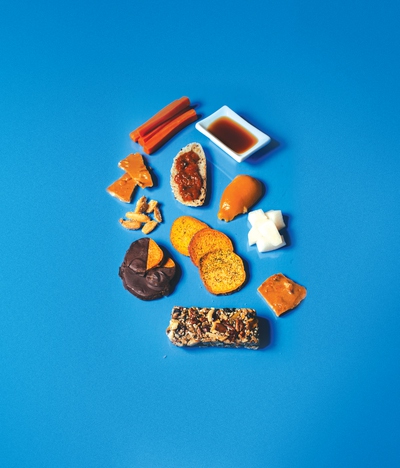
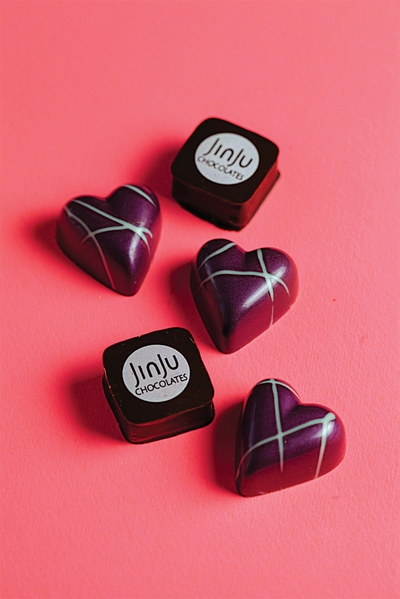
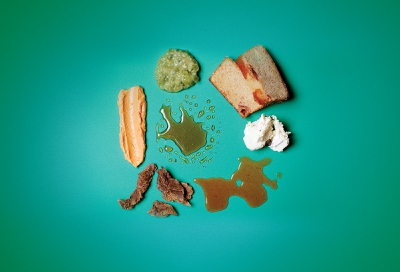

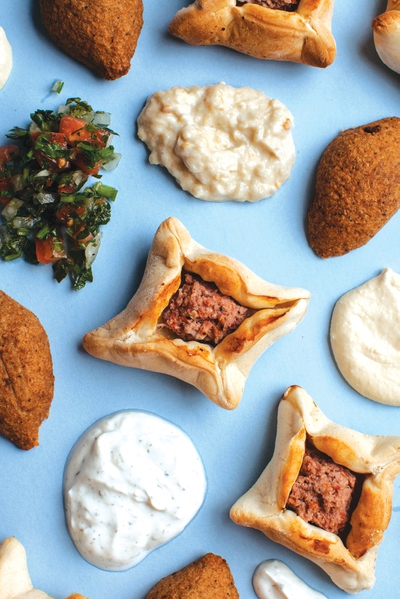
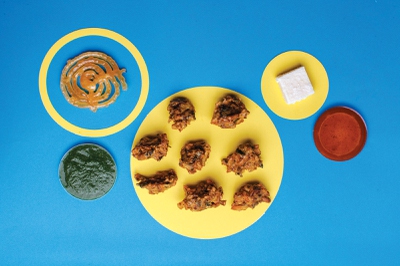

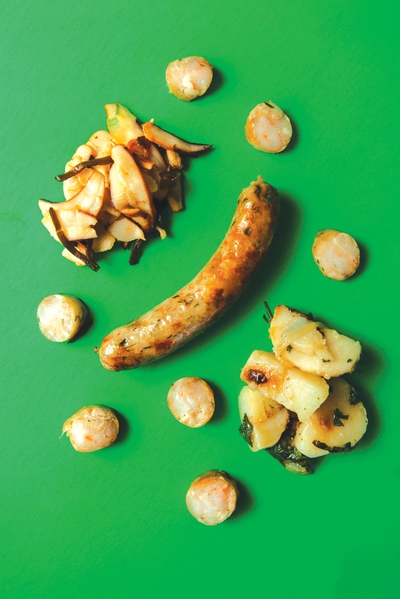

Join the Discussion:
Check this out for a full explanation of our conversion to the LiveFyre commenting system and instructions on how to sign up for an account.
Full comments policy